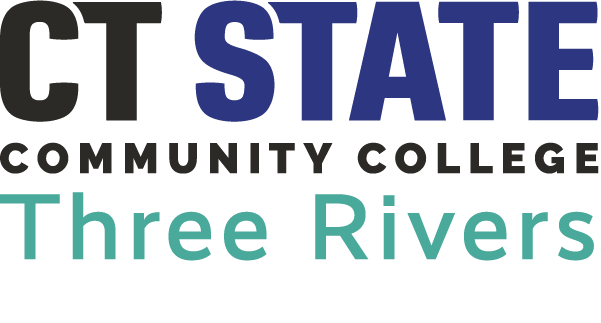Norwich’s Civil War Regiment Honored with Plaque at Three Rivers
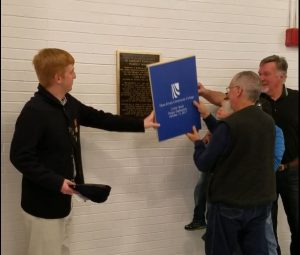
Members of Sedgwick Camp No. 4 unveil the plaque with descendants of the regiment.
On Friday, October 13, officers of Sedgwick Camp No. 4, the Sons of Veterans of the Civil War, gathered at Three Rivers to dedicate a plaque honoring the 18th Connecticut Volunteer Infantry. The plaque was discovered in a vault in Norwich City Hall and returned to the group. “As far as we can tell,” says City Historian Dale Plummer, “the plaque was intended for the former New London County Fairgrounds, but the 1938 Hurricane and development of the site for housing prevented its placement.”
Matthew Reardon, commander of the Officers of Sedgwick Camp No. 4, the Sons of Veterans of the Civil War, and director of the New England Civil War Museum, noted that the “home regiment” was made up of men from New London, Windham, and Tolland Counties, with officers and many of the enlisted men drawn from Norwich and its immediate vicinity. Mustered into service in August of 1862, the 18th Connecticut served primarily in the Shenandoah Valley of Virginia. Before it was mustered out in June of 1865, it participated in the Battles of Winchester, New Market, and Piedmont, as well as 19 other engagements.
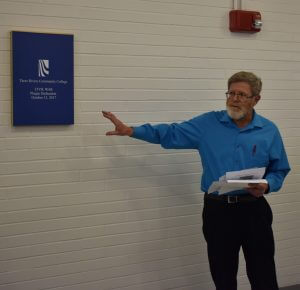
Dale Plummer, the Norwich City Historian, explains the significance of the plaque.
The ceremony began outside Three Rivers with an invocation by Rev. George Blair of the United Congregational Church and included a presentation of the United States and Connecticut Colors by the Norwich Police Color Guard and a Roll Call of the Battle Dead read by John P. Sullivan, a member of Sedgwick Camp No. 4. After the Roll Call, descendants of the regiment, including Alan Crane and Sullivan, spoke of their ancestors’ time in the regiment as well as their lives after the war. This was followed by remarks from Norwich Mayor Deberey Hinchey and Dean of Administrative Services Steve Goetchius of Three Rivers.
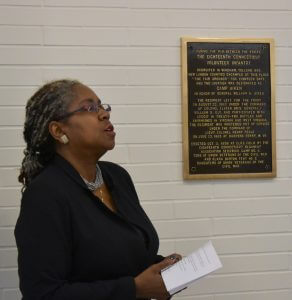
Dianne Daniels, President of the Norwich branch of the NAACP, dedicates the plaque.
The group then proceeded inside to the plaque, which is mounted on the wall across from room C113. There Plummer explained the significance and sacrifice of the 18th Connecticut Volunteer Infantry, saying: “We are gathered here to dedicate a plaque honoring the 18th Connecticut Volunteer Infantry, local men who gathered near here prior to entering the Civil War, America’s deadliest conflict. The Civil War and its aftermath reshaped American life profoundly. It redefined who Americans were, and their civil rights.” His full remarks can be read here.
Reardon unveiled the plaque, and afterwards, it was dedicated by Dianne Daniels, President of the Norwich Branch of the NAACP. The ceremony concluded with a benediction from Father Robert Washabaugh of St. Mary’s R. C. Church.
READ MOREIn the News | Our View: Let’s stop shouting and have a discussion (Editorial)
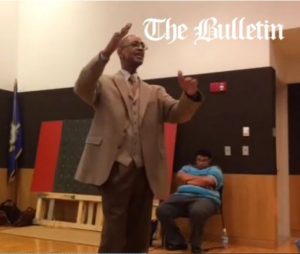 Norwich, CT (Norwich Bulletin, September 28, 2017) — Enough with all the shouting.
Norwich, CT (Norwich Bulletin, September 28, 2017) — Enough with all the shouting.
We shouted at each other over Civil War monuments in Charlottesville, Virginia, with white supremacists and their allies battling counter-protesters. Now tempers are flaring over President Donald Trump’s harsh criticism of NFL players protesting during the national anthem. Some fans have literally burned the jerseys of their favorite players, and Trump has called out “spoiled” players for denigrating the flag, a symbol of American pride and patriotism. He also canceled the Golden State Warriors’ invitation to visit the White House.
“The NFL and NBA shout back that the administration has no empathy for the plight of minorities in America,” Edward Derr, of Three Rivers Community College, said Monday night. “And all we do is shout at each other even louder while America becomes more and more divided.“
The college and Derr, the campus’ student diversity and Title IX coordinator, took it upon themselves this week to rise above it all and set an example by hosting a pair of forums across two nights titled “Is Hatred and Violence the New Norm in American Society?“
The forums addressed the continuing plague of discrimination in American society, whether in the form of racism, homophobia, anti-Semitism, sexism, and anti-immigration sentiments.
“We become complacent and engulfed in other issues such as the economy, foreign affairs, the environment, outbreaks of civil war in the Third World, and terrorism at home and abroad,” said Derr, a professor of history and sociology. “Yet, we have failed to realize that the anger and frustration are all connected to all of the same issues.” He noted that memorials in Charlottesville and other places “are merely symbolic metaphors for the anger felt by African-Americans over the perceived continued racist attitudes of the police and American society.“
Confederate statues, Confederate flags, and swastikas represent prejudice, discrimination, and exclusion for many Americans, yet for some they are simply cultural symbols.
The forum panelists, including students, discussed how these differences can be resolved. And while they hardly solved the world’s problems, they took a key step: They had a discussion.
During 2017 and since Trump took office, college campuses around the country have experienced major student protests. These students claim that colleges promote hostile environments that harm minority students and hinder their ability to learn. To deal with these problems, students have demanded that college administrators create “safe-spaces” in which offensive or disagreeable speech is prohibited and punished. These demands have sparked debate about the nature of free speech and higher education, and a recent survey found that a fifth of college undergrads say it’s acceptable to use physical force to silence a speaker who makes “offensive and hurtful statements.“
We agree with Derr, who has been organizing forums for seven years, and who put today’s events into a long-term context.
“The college campus must be an environment in which we can discuss our differences in a civil manner, where we listen to each other. We must put violence aside and remember that Enlightenment ideology, the foundation of our constitutional society, emphasizes the rule of law; we must use our political and legal resources to continue to build an American society that embraces diversity, equity, and inclusion for all in America,” Derr said.
— Editorial Board, Norwich Bulletin
The original editorial can be found here: “Our View: Let’s stop shouting and have a discussion”
READ MOREIn the News | Three Rivers panel analyzes history of racism
Norwich, CT (Norwich Bulletin, September 26, 2017) — In the wake of violent protests and tweeting scandals, students and faculty of Three Rivers Community College gathered Tuesday evening for a forum on race in America. Although originally intended to analyze the cultural symbolism of the protests in Charlottesville, Virginia, a new theme quickly emerged: History repeats itself.
The panel, comprising state Sen. Cathy Osten, Three Rivers professors Janet Hagen and Roxanne Tisch and student Jason Chavez, was moderated by Edward Derr, the college’s student diversity and Title IX adviser. Derr has been organizing forums on cultural issues for seven years at the college, and Tuesday night’s event was part one of a two-part installment called “Is Hatred and Violence the New Norm.”

Edward, Derr, a professor at Three Rivers Community College, leads a forum titled “Is Hatred and Violence the New Norm?” Tuesday at the Norwich college. Behind him are panelists Jason Chavez, a student at the college, Roxanne Tisch, a math professor there, and state Sen. Cathy Osten. See videos at NorwichBulletin.com (John Shishmanian/Norwich Bulletin)
Derr kicked off the evening with a short presentation relating current events to past ones. He aligned photographs of Colin Kaepernick, the quarterback who raised eyebrows while kneeling during the national snthem, alongside Tommie Smith and John Carlos, athletes whose medals were revoked after raising their fists from the Olympic podiums in 1968.
“Issues like this never truly go away. It’s 2017 but it may as well be 1968,” Derr said.
If a historic theme wasn’t apparent early on, it definitely became evident once the panel tackled the opioid crisis, which has hit Eastern Connecticut particularly hard. Osten traced the issue through previous decades, referencing her tenure in the state Department of Correction.
“This is something that is not new. The opioid crisis had been a problem in urban areas for years. However, now it has migrated into suburbs and rural areas and it’s garnering much more attention. It’s not until now that so many people have begun to ask ‘what should we do about this?’ ”
Although waters were bound to be muddied when discussing hot-button issues, everyone in the room seemed to agree on one thing.
“These conversations should be happening everywhere,” Hagen said.
Preceding the event, Derr, a professor of history and sociology, said he received emails from students concerned that hosting the forum would “only make things worse” and “aggravate what’s already a sensitive situation.” However, with coming forums planned on immigration and women’s leadership, Derr said any level of backlash does not deter him from planning such events.
“What scares me most is that people will bury their heads in the sand and not talk about difficult issues. Discussion is what can make things better.”
— By Stephanie Menders, Norwich Bulletin staff writer
The original article can be found here: ‘Three Rivers panel analyzes history of racism’
Videos of the event can be found here:
READ MORE